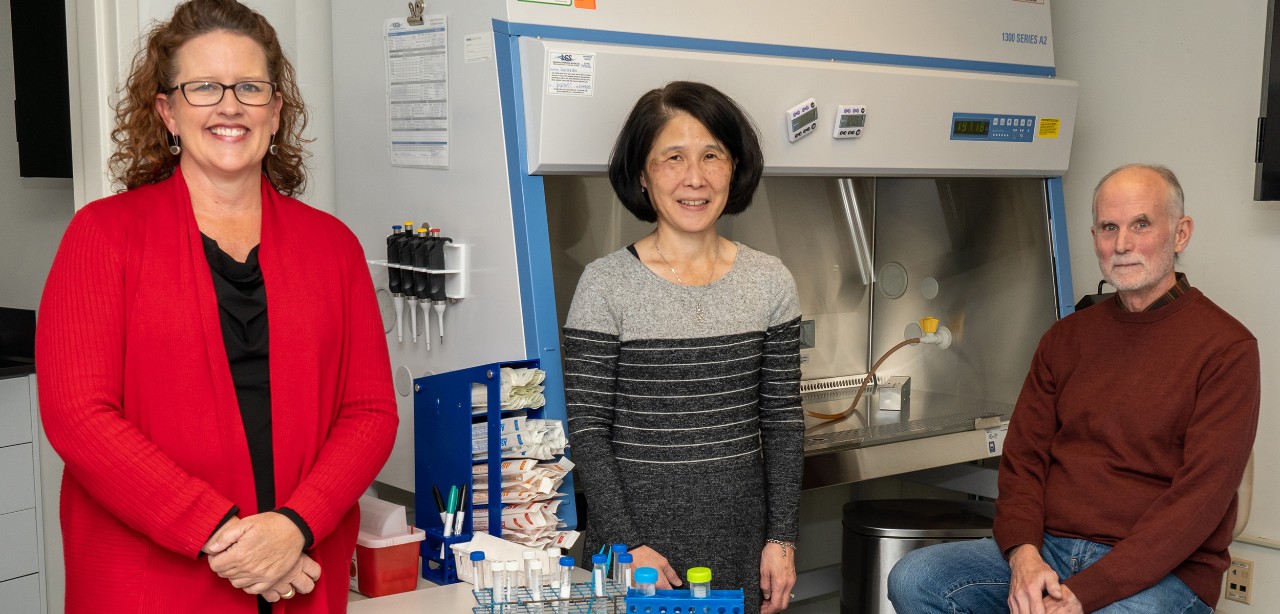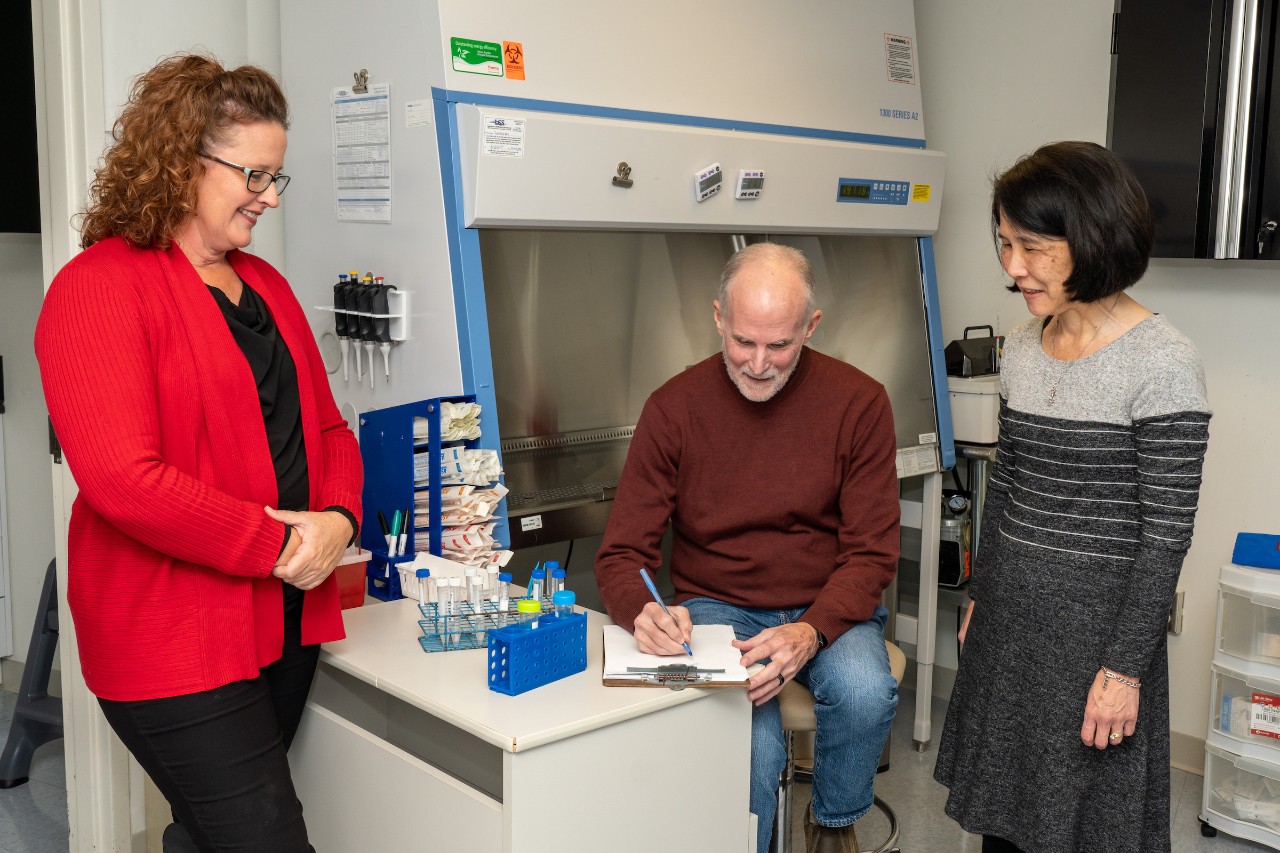UC Clermont professor receives $100,000 grant for cancer research
A UC Clermont professor has received a $100,000 PhRMA Foundation Faculty Starter Grant in drug discovery for her work on new antibiotics capable of taking on cancer stem cells.
Jill Shirokawa, assistant professor of chemistry, is spearheading the groundbreaking research at the college, which brings together two projects previously started by her UC Clermont colleagues. Their work is aimed toward a lofty goal.
“Our long-term goal is to find new anti-cancer drugs,” Shirokawa said.
Professor Emeritus Cliff Larrabee first began cancer research at UC Clermont in 2009. In 2019, Larrabee and his co-inventor, former student Mary Warmin, submitted a patent for a new nanocarrier targeted drug delivery system based on undecylenic acid — i.e., a more effective method of delivering chemotherapy drugs to cancer patients. Nanocarriers are even smaller than cells and help drugs dissolve in the blood and protect them from the body’s defense mechanisms. Larrabee, who is a consultant on Shirokawa’s project, also believed the new technology could potentially deliver antibiotics directly to cancer tumors.
From left, Krista Clark, professor of biology, Jill Shirokawa, assistant professor of chemistry, and Clifford Larrabee, professor emeritus, in their research space at UC Clermont. Photo/Danny Kidd
“You can kill cancer stem cells with antibiotics,” Larrabee said. “And if you can kill them before they differentiate, maybe you can prevent or slow metastasis.”
While traditional antibiotics have shown promise in the cancer-fighting arena, researchers hope to discover new drugs that hold even more potent power — and less antibiotic resistance. To that end, in 2017, UC Clermont became the first institution in Ohio to join the Small World Initiative, an international project that uses undergraduate research to tackle the growing problem of antibiotic resistance head-on. Professor Krista Clark, a cell biologist by training, leads her students through isolating bacteria from soil samples taken in their local environments. The bacteria strains then are screened for their ability to produce antibiotics that are effective against the most common antibiotic-resistant bacteria.
Our long-term goal is to find new anti-cancer drugs.
Jill Shirokawa Assistant Professor of Chemistry, UC Clermont
Clark, Larrabee and Shirokawa in their research space at UC Clermont. Photo/Danny Kidd
After Clark’s students grow the bacteria in the lab and extract a crude antibiotic from it, Shirokawa’s team places the antibiotic into the nanoparticle designed by Larrabee to protect the drug from getting destroyed when injected into the body. To date, the researchers have identified 19 bacteria that produce antibiotic-isolating compounds and show initial signs that they can kill cancer cells, Shirokawa said.
“Our goal is to identify from those extracts the compound that actually kills the cancer stem cells,” Shirokawa said. “We would love to eventually get this treatment into the clinical setting, where it could actually be delivered to cancer patients.”
Shirokawa, who took the reins of the project in 2020, plans to use the PhRMA grant to purchase supplies and small equipment for the college’s budding anti-cancer drug discovery lab. In the future, she hopes to apply for additional funds to increase the number of students involved in the research. Currently, two full-time lab assistants work alongside one or two UC Clermont students each semester. She is asking potential science faculty about their research interests during the hiring process, too.
“We hope to continue to build research opportunities at UC Clermont,” Shirokawa said. “Every faculty member or student involved brings a different perspective to the work.”
UC Clermont Dean Jeff Bauer said the research happening at the college through Shirokawa’s work is exciting and supported in part by donors through the Sophia Fund for Innovation.
“We are delighted to support the research by Drs. Clark, Larrabee and Shirokawa that is focused on improving the efficacy of cancer drug delivery,” Bauer said. “UC Clermont is uniquely positioned to provide undergraduate students with the opportunity to participate in this ground-breaking work that will improve lives in our community — and beyond.”
Featured photo: Jill Shirokawa, assistant professor of chemistry, working in the anti-cancer drug discovery lab at UC Clermont. Photo/Danny Kidd
Latest UC News
- It’s a mindset: Meet the visionaries redefining innovation at 1819Innovation is being redefined by enterprising individuals at UC’s 1819 Innovation Hub. Meet the forward thinkers crafting the future of innovation from the heart of Cincinnati.
- UC’s spring Visiting Writers Series promises robust, diverse line-upLovers of literature, poetry and the written word can look forward to a rich series of visiting writer presentations, offered through UC’s College of Arts and Sciences department of English, coming this spring.
- UC students well represented in this year’s Inno Under 25 classEntrepreneurialism runs through the veins of University of Cincinnati students, as confirmed by the school’s strong representation in this year’s Inno Under 25 class.
- UC professor Ephraim Gutmark elected to National Academy of InventorsEphraim Gutmark, distinguished professor of aerospace engineering at the University of Cincinnati, was elected to the 2024 class of the prestigious National Academy of Inventors.
- UC Law professors recognized for scholarly excellenceUniversity of Cincinnati College of Law professors Stephanie McMahon and Andrew Mamo were recently recognized for their scholarly contributions.
- ADAAPT: Growing Student IdeasSteven Doehler, an industrial design professor at the University of Cincinnati’s College of Design, Architecture, Art, and Planning (DAAP), says he prioritizes the entrepreneurial aspect of a student's design product – which led him to create HomeGrown Studio.















